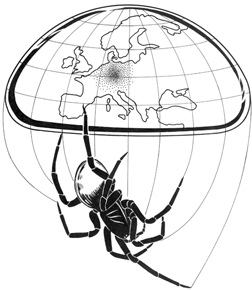Heft 36 (2008)
Erstnachweis der Wolfspinne Alopecosa barbipes (Araneae: Lycosidae) in Nordrhein-Westfalen
First record of Alopecosa barbipes (Araneae: Lycosidae) in North Rhine-Westphalia, Germany
Alopecosa accentuata; Alopecosa barbipes; faunistics; identification; North Rhine-Westphalia
Abstract
In September 2005, one male specimen of the wolf spider genus Alopecosa was discovered and photographed in heathland near Haltern, North Rhine-Westphalia, Germany. It was identified as A. barbipes (Sundevall, 1833), as it showed the species- and sex-specific tibial hair-brush absent in the sibling species A. accentuata. Three years later, two other specimens of A. barbipes were collected in the same area. These findings indicate that the species is more widespread than originally thought. Some details concerning the distribution of A. accentuata and A. barbipes and the problem of synonymy are discussed.
Pandava laminata, eine weitere nach Deutschland importierte Spinnenart (Araneae: Titanoecidae)
Pandava laminata, a further spider species introduced into Germany (Araneae: Titanoecidae)
Central Europe; Cologne Zoo; identification; introduced species; Southeast Asia; taxonomy
Abstract
Pandava laminata (Thorell, 1878) was recorded for the first time from Germany at the Cologne Zoo. The species was most likely introduced with plants or cargo from Southeast Asia. Characters important for identification at species, genus and family level are listed and partly illustrated.
Spiders (Araneae) from the Panský diel (Starohorské vrchy Mts, Slovakia)
Spiders (Araneae) from the Panský diel (Starohorské vrchy Mts, Slovakia)
biomonitoring; faunistics; new record; NATURA 2000; Starohorské vrchy Mts
Abstract
Spiders were collected at the massif 'Panský diel' near the city of Banská Bystrica (Central Slovakia). We recorded 252 spider species for the territory and one new species for Slovakia. Although the summit reaches an altitude of 1.100 m a.s.l., more or less thermophilous species apparently prevail here, especially at lower moderate sites. On the other hand, only several typical oreophilous species were documented. Many recorded species are scarce or even very rare. This indicates the very high value of this territory from both a genetic and an environmental perspective.
Chthonius (Ephippiochthonius) poeninus – ein „Schweizer Endemit“ in den Allgäuer Alpen (Pseudoscorpiones: Chthoniidae)
Chthonius (Ephippiochthonius) poeninus – a “Swiss endemic species” in the Allgäu Alps (Pseudoscorpiones: Chthoniidae)
false scorpions; Germany; grazing management; new record; subalpine habitats
Abstract
In the course of a long term survey on the effects of grazing on the diversity of alpine grasslands, the false scorpion Chthonius (Ephippiochthonius) poeninus Mahnert, 1979 was recorded for the first time outside of Switzerland. The preferred habitat at the locality Alpe Einödsberg (Germany, Bavaria) differs strongly from previous findings. Our data suggest an association with Nardus grasslands (Geo montani-Nardetum), whereas earlier records originated from leaf litter, moss and mouldy trunks. Furthermore, the new records between 1540 m and 1973 m above sea level are the first from the subalpine region of the Alps (hitherto C. poeninus was known from 550 m to 1450 m). In the study region, extensive grazing seems to have a positive effect on the abundance of the species, while it is missing from intensively grazed pastures.
A glimpse of the tropics – spiders (Araneae) in the greenhouses of the Botanic Garden Berlin-Dahlem
A glimpse of the tropics – spiders (Araneae) in the greenhouses of the Botanic Garden Berlin-Dahlem
Europe; Germany; introduced species; Ochyroceratidae; Oecobiidae; Oonopidae
Abstract
In a survey of the spider fauna in greenhouses of the Botanic Garden Berlin-Dahlem, 30 spider species were recorded. Two species are new to Europe: Theotima minutissima (Petrunkevitch, 1929) and Heteroonops spinimanus (Simon, 1891). T. minutissima is the first member of the family Ochyroceratidae reported from Europe. Oecobius navus Blackwall, 1859 is new to Central Europe. Triaeris stenaspis Simon, 1891, is recorded from Germany for the first time. Zodarion italicum (Canestrini, 1868) is new to eastern Germany. Despite the discovery of some species previously unknown to Germany, the spider fauna in the Botanic Garden consisted mainly of wellknown synanthropic species and common inhabitants of greenhouses. Several alien spiders recently found in greenhouses, garden centers and houses were not recorded in the Botanic Garden. The species composition of the exotic spider fauna in greenhouses seems to depend chiefly on the specific modes of acquisition of plants and plant substrate.
Linyphia triumphalis, a junior synonym of Centromerus pabulator (Araneae, Linyphiidae)
Linyphia triumphalis, a junior synonym of Centromerus pabulator (Araneae, Linyphiidae)
new synonymy; Romania
Abstract
Linyphia triumphalis Denis, 1952 was found to be a junior synonym of Centromerus pabulator (O.P.-Cambridge, 1875) (Araneae, Linyphiidae). New synonymy.
Rainer Foelix, Bruno Erb & Michael Hauswirth (2007): Mikroskopische Anatomie der Spinnen
Rainer Foelix, Bruno Erb & Michael Hauswirth (2007): Mikroskopische Anatomie der Spinnen
book review
Abstract
book review: Rainer Foelix, Bruno Erb & Michael Hauswirth (2007): Mikroskopische Anatomie der Spinnen.
Jörg Wunderlich (2008): Fossil and extant spiders (Araneae). Fossile und heutige Spinnen. – Beiträge zur Araneologie 5: 1-870
Jörg Wunderlich (2008): Fossil and extant spiders (Araneae). Fossile und heutige Spinnen. – Beiträge zur Araneologie 5: 1-870
book review
Abstract
book reviewJörg Wunderlich (2008): Fossil and extant spiders (Araneae). Fossile und heutige Spinnen. – Beiträge zur Araneologie 5: 1-870


